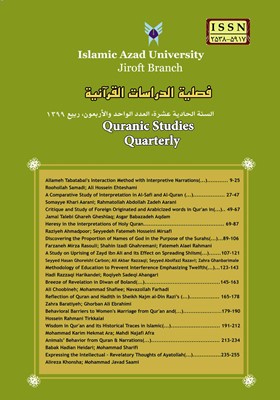Breeze of Revelation in Diwan of Boland Iqbal
Subject Areas : Quarterly Sabzevaran FadakAli Choobineh 1 , Mohammad Shafiee 2 , Navazollah Farhadi 3
1 - PhD Candidate, Persian Language &Literature, Islamic Azad University, Gachsaran Branch
2 - PhD Candidate, Islamic Law & Jurisprudence, Islamic Azad University, Gachsaran Branch
3 - Assistant Professor, Persian Language &Literature, Farhangiyan University, Shiraz
Keywords: آیه, قرآن, اقتباس, پیامبران, Quran, verse, Literary adaptation, بلند اقبال, Messengers, Boland Iqbal,
Abstract :
The miracle of Holy Quran, its charm, eloquence, rhetoric and its uniqueness have caused poets to turn to Quran to deepen and enrich their poems. The greatest poets have enjoyed this Divine book in various ways, which makes the poems eternal. In the meantime, Mirza Seyyed Razi Mostofi pen – named to Boland Iqbal is one of the anonymous contemporary religious poets who has been able to create an eternal work in a beautiful form of poetry selecting bests from Holy Quran. In this article, with a descriptive – analytical method, the effectiveness of Iqbal's poetries is studied in which in some cases a term or part of a Verse have been adapted directly and, in some cases he has implicitly referred to the verses of Qur'an, and in some cases have turned to the translation. Findings show that the manifestation of Qur'an in the poet's Diwan in various forms indicates the poet's mastery of Qur'an and less pages can be found in his poetry in which the word of revelation does not appear.
قرآن کریم. ترجمه مهدی الهی قمشهای.
ابراهیمی، مهدی. 1384ش، نسیم وحی در مثنوی عشق، تهران: مؤسسه فرهنگی طه.
بحرانی، هشام بن سلیمان. 1416ق، البرهان فی تفسیر القرآن، تهران: بنیاد بعثت.
بلند اقبال، میرزا سید رضی مستوفی. 1385ش، دیوان شعر، با مقدمه منصور رستگار فسایی، شیراز: دریای نور.
داور، مفید بن محمد نبی. 1386ش، مرآة الفصاحة، به تصحیح دکتر طاووسی، شیراز: انتشارات نوید.
دیوان بیگی شیرازی، سید احمد. 1382ش، حدیقة الشعراء، به تصحیح دکتر عبدالحسین نوایی، تهران: انتشارات زرین.
رکن زاده، آدمیت. 1383ش، دانشمندان و سخن سرایان فارس، تهران: زرین.
رنجبر، احمد. 1385ش، بدیع، تهران: اساطیر.
شمس المعالی، محمد حسین. 1377ش، ابدع البدایع، به اهتمام حسین جعفری، با مقدمه جلیل تجلیل، تبریز: احرار.
شمیسا، سیروس. 1383ش، نگاهی تازه به بدیع، تهران: انتشارات فردوس.
طبرسی، فضل بن حسن. 1360ش، مجمع البیان فی تفسیر القرآن، گروه مترجمان، تهران: فراهانی.
فسایی، میرزا حسن. 1386ش، فارسنامه ناصری، به تصحیح دکتر منصور رستگار فسایی، تهران: امیرکبیر.
قرائتی، محسن. 1383ش،تفسیر نور، تهران: مرکز فرهنگی درسهایی از قرآن.
قرشی، علی اکبر. 1377ش،احسن الحدیث، تهران: بنیاد بعثت.
معین، محمد. 1388ش، فرهنگ فارسی، تهران: اشجع.
مکارم شیرازی، ناصر. 1374ش،تفسیر نمونه، تهران: دار الکتب الاسلامیه.
میبدی، احمد بن محمد. 1352ش، تفسیر ادبی عرفانی قرآن مجید، خلاصه برداری، حبیب آموزگار، تهران: اقبال.
هاشمی، احمد. 1388ش، جواهر البلاغه، مترجم: حسن عرفان، قم: بلاغت.
همایی، جلال الدین. 1389ش، فنون بلاغت و صناعات ادبی، تهران: مهارت.
مقالات
چریکی، الهام. 1395ش، «فضائل و رذایل اخلاقی در دیوان میرزا سید رضی متخلص به بلند اقبال»، پایان نامه کارشناسی ارشد، دانشگاه آزاد اسلامی واحد گچساران.
حجت، محمد و جلال ایرانمنش. 1397ش، «جلوههای عینی قرآن کریم در اشعار صائب تبریزی»، مجله علمی پژوهشی فصلنامه مطالعات قرآنی، سال نهم، شماره 34، صص221-237.
دهبزرگی، شیوا. 1394ش، «بررسی اشعار، صنایع بدیعی و... در دیوان میرزا سید رضی متخلص به بلند اقبال»، پایان نامه کارشناسی ارشد، دانشگاه آزاد اسلامی واحد گچساران.
ذوالفقاری، محسن و حجت الله امید علی. 1396ش، «تحلیل کارکردهای آیات قرآن در اشعار شاه نعمت الله ولی»، مجله علمی پژوهشی پژوهشهای ادبی قرآنی، سال پنجم، شماره اول، صص151-171.
محمدی، هاشم. 1386ش، «بلند اقبال شیرازی شاعری هنرمند و خردورز»، مجله نامه پارسی، سال دوازدهم، شماره اول و دوم، صص191-197.
_||_
Bibliography
The Holy Quran. Translating Mahdi Divine Qomisha
Ebrahimi, Mehdi (2005), NasimRehovi in Masnavi-e Love, Tehran, Cultural Institute of Taha
Hasham bin Soleiman, (1416), Al-BaheranFeiTafsir al-Quran, Tehran, Be'sat Foundation
Long Iqbal, MirzaSayedRaziMostofi, (2006), The Divan of Poetry, with the introduction of Mansour RastegarFasaei, Shiraz, Sea of Light
Christian, Inspirational (1395) Virtues and Moral Morals in Divan MirzaSeyyedRazi, Senior Lecturer, Master's thesis, Islamic Azad University, Gachsaran Branch
Hajat, Mohammad, Jalal Iranmanesh (1397) The Objective Effects of the Holy Qur'an in the Poems of SaebTabrizi, Journal of Qur'anic Studies, Ninth No. 34, pp. 221-237
Dawir, Dabiban Mohammad Nabi (2007), Marah al-Fassah, Corrected by Dr. Tawousi, Shiraz, Navid Publications
Debzorghi Shiva (1394) Review of poetry, novels and ... in the Divan MirzaSeyyedRazi, Senior Lecturer, Master's thesis, Islamic Azad University, Gachsaran Branch
Divan BeigiShirazi, Seyyed Ahmad (2003), Hadiqeh al-Sha'ra, Corrected by Dr. AbdolhosseinNovei, Tehran, Zarrin Publishing
Zulafaghi, Mohsen, HojatollahOmid Ali (1396), Analysis of the Functioning of Quranic Verses in the Poems of Shah NematollahVali, Journal of Quranic Literary Studies, Vol. 5, No. 1, pp. 151-171
Rankzadeh, Adamit, (2004), Scientists and speakers of Fars, Tehran, Zarrin
Ranjbar, Ahmad (2006), Badi, Tehran, mythology
Shams al-Ma'ali, Mohammad Hussein (1377), Abu Daha al-Bada'ili, by the works of HosseinJa'fari, with the introduction of JalilKedalil, Tabriz, Ahrar
Shamsa, Sirous (2004), A New Look at the Excellency, Tehran, Ferdows Publications
FazlibnHasan, (1360), Assembly of the Faith of Al-Quran, Translators Group, Tehran, Farahani
Fasaei, MirzaHasan (2007), FarshmaNaseri, Corrected by Dr. Mansour RastegarFassaei, Tehran, Amir Kabir
Report, Mohsen (2004), Commentary on Noor, Tehran, Center for Cultural Lessons from the Qur'an
Kurashi, Ali Akbar (1377), Ahsan al-Hadith, Tehran, Be'sat Foundation
Mohammadi, Hashem, (2007), Long IqbalShirazi, Artist and Wisdom Poetry. Persian Language Letter, Year 12, Number One and Two, pp. 191-197.
Moain, Mohammad (2009), Farsi Culture, Tehran, Ashjah
MakaremShirazi, Nasser (1374), Sample Commentary, Tehran, Darul Kabul Eslamiyeh
Mibadi, Ahmadbn Mohammad, (1352), Mystic Interpretation of Quran Majid, Summary, HabibAmoozgar, Tehran, Iqbal
Ham, Jalal-e-Din, (2010), Literary Techniques, Tehran, Skills
Hashemi, Ahmad, (2009), Ja'ahar al-Balagheh, translator, HasanErfan, Qom, Rhetoric

